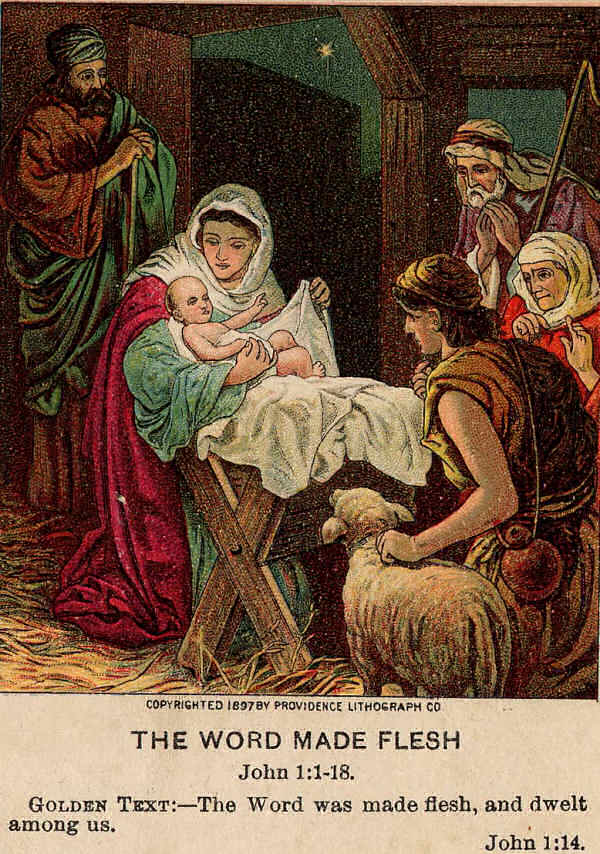+ Blue Letter Bible/KJV + 개역한글 성경구절
글 수 298
2024.6.12 19:37:20

▶ 이름 Names.
These are often expressive of character or of relationship. God was revealed to Abraham, Isaac and Jacob, as GOD ALMIGHTY, which indicates the character in which God was pleased to be known by them: He was not known to them as JEHOVAH. Ex. 6:3. This does not mean that they had not heard of the name, but that it did not express the character of His relationship with them.
(출06:3 내가 아브라함과 이삭과 야곱에게 전능의 하나님으로 나타났으나 나의 이름을 여호와로는 그들에게 알리지 아니하였고
To Moses He said, "I am JEHOVAH," and by this name He was known to Israel: it formed the basis of their relationship with God. When power was committed to the Gentiles under the headship of Nebuchadnezzar it was said, "THE GOD OF HEAVEN hath given thee a kingdom, power, and strength, and glory." Dan. 2:37. In Christianity God is made known under the name of FATHER. John 20:17. Much is involved in the various names by which God has been pleased to make Himself known. So the Lord Jesus has various names: Son of God, Immanuel, Son of man, etc.: they all designate one Person, but each has its own import. Throughout the N.T. HIS NAME is the centre of all blessing. Isa. 9:6; Phil. 2:9-11.
(단02:37 왕이여 왕은 열왕의 왕이시라 하늘의 하나님이 나라와 권세와 능력과 영광을 왕에게 주셨고
(요20:17 예수께서 이르시되 나를 만지지 말라 내가 아직 아버지께로 올라 가지 못하였노라 너는 내 형제들에게 가서 이르되 내가 내 아버지 곧 너희 아버지, 내 하나님 곧 너희 하나님께로 올라간다 하라 하신대
(사09:6 이는 한 아기가 우리에게 났고 한 아들을 우리에게 주신 바 되었는데 그 어깨에는 정사를 메었고 그 이름은 기묘자라, 모사라, 전능하신 하나님이라, 영존하시는 아버지라, 평강의 왕이라 할 것임이라
(빌02:9-11 9 이러므로 하나님이 그를 지극히 높여 모든 이름 위에 뛰어난 이름을 주사 10 하늘에 있는 자들과 땅에 있는 자들과 땅 아래 있는 자들로 모든 무릎을 예수의 이름에 꿇게 하시고 11 모든 입으로 예수 그리스도를 주라 시인하여 하나님 아버지께 영광을 돌리게 하셨느니라
God has authority to give names: cf. Rev. 2:17; and the name given by God indicates that which God sees fit to express in the one to whom it is given. Hence 'name' is characteristic. He altered the names of some persons: Abram was changed to Abraham; Sarai to Sarah; Jacob to Israel; and He gave reasons why they were altered; and the Lord Jesus gave Simon the name of Peter. God also applied to Israel symbolical names: as Lo-ammi, 'not my people;' and Lo-ruhamah, 'not having obtained mercy,' to mark His attitude towards them.
(계02:17 귀 있는 자는 성령이 교회들에게 하시는 말씀을 들을지어다 이기는 그에게는 내가 감추었던 만나를 주고 또 흰 돌을 줄 터인데 그 돌 위에 새 이름을 기록한 것이 있나니 받는 자 밖에는 그 이름을 알 사람이 없느니라
In the O.T. persons often gave their children names of significance: thus the wife of Phinehas, when she heard that the ark of God was taken, and that her husband and her father-in-law were dead, called her child Ichabod, 'where is the glory?' for the glory was departed from Israel, the ark being taken. Where the reason for a name is mentioned, all is plain; but where no reason is given, the meaning cannot always be ascertained. A name may bear several meanings, by being traced to different roots. For many years lists of the O.T. proper names, with their significations, have been given in Concordances, etc. (mostly as drawn from Gesenius), and sometimes certain deductions have been drawn from those meanings as giving the character of the persons bearing the names; but it should be remembered that in many instances, several persons have borne the same name, persons who were quite different in their status and character; so that the names could have had nothing to do with their characters. It is evident also from the case of John the Baptist that it was customary to name a child after some of his ancestors. On this ground objection was made to his being called John. Luke 1:59-63.
(눅01:59-63 59 팔일이 되매 아이를 할례하러 와서 그 부친의 이름을 따라 사가랴라 하고자 하더니 60 그 모친이 대답하여 가로되 아니라 요한이라 할 것이라 하매 61 저희가 가로되 네 친족 중에 이 이름으로 이름한 이가 없다 하고 62 그 부친께 형용하여 무엇으로 이름하려 하는가 물으니 63 저가 서판을 달라 하여 그 이름은 요한이라 쓰매 다 기이히 여기더라
Besides this, modern Hebrew scholars give very different meanings to some of the names, making their signification more and more uncertain. For instance, Abishai signifies, according to Gesenius, 'father of a gift'; but Fürst interprets it, 'Ab is existing,' or 'God is existing.' Adami signifies 'human,' Gesenius; but 'fortress,' Fürst. Adonikam signifies 'lord of the enemy,' Gesenius; but 'Adon is assisting,' Fürst. In some words other lexicographers, as Ewald, differ from both of the above.
--- Morrish Bible Dictionary
개역한글KHRV( 120일1독, 1년1독, 권별, 성경통독 )
STUDY - 구절(WESLEY), 단락(MATTHEW), 읽기(Wayne),
Dictionary - Chapter, OT구약, NT신약, 테마별,
(*.39.150.226)
|
.
성경연대표
1.창조
2.족장
3.출애굽
4.광야
5.정복
6.사사
7.통일왕국
8.분열왕국
9.포로
10.포로귀환
11.중간
12.예수
13.초대교회
14.세계선교
관련그림.지도 1.창조
2.족장
3.출애굽
4.광야
5.정복
6.사사
7.통일왕국
8.분열왕국
9.포로
10.포로귀환
11.중간
12.예수
13.초대교회 Ani
1창세기[Genesis] 2출애굽기[Exodus] 3레위기[Leviticus] 4민수기[Numbers] 5신명기[Deuteronomy] 6여호수아[Joshua] 7사사기[Judges] 8룻기[Ruth] 9사무엘상[I Samuel] 10사무엘하[II Samuel] 11열왕기상[I Kings] 12열왕기하[II Kings] 13역대상[I Chronicles] 14역대하[II Chronicles] 15에스라[Ezra] 16느헤미아[Nehemiah] 17에스더[Esther] 18욥기[Job] 19시편[Psalms] 20잠언[Proverbs] 21전도서[Ecclesiastes] 22아가[Song of Solomon] 23이사야[Isaiah] 24예레미야[Jeremiah] 5예레미아애가[Lamentations] 26에스겔[Ezekiel] 27다니엘[Daniel] 28호세아[Hosea] 29요엘[Joel] 30아모스[Amos] 31오바댜[Obadiah] 32요나[Jonah] 33미가[Micah] 34나훔[Nahum] 35하박국[Habakkuk] 36스바냐[Zephaniah] 37학개[Haggai] 38스가랴[Zechariah] 39말라기[Malachi] 40마태복음[Matthew] 41마가복음[Mark] 42누가복음[Luke] 43요한복음[John] 44사도행전[Acts] 45로마서[Romans] 46고린도전서[I Corinthians] 47고린도후서[II Corinthians] 48갈라디아서[Galatians] 49에베소서[Ephesians] 50빌립보서[Philippians] 51골로새서[Colossians] 52데살로니가전서[I Thessalonian] 53데살로니가후서[2 Thessalonian] 54디모데전서[I Timothy] 55디모데후서[II Timothy] 56디도서[Titus] 57빌레몬서[Philemon] 58히브리서[Hebrews] 59야고보서[James] 60베드로전서[I Peter] 61베드로후서[II Peter] 62요한일서[I John] 63요한이서[II John] 64요한삼서[III John] 65유다서[Jude] 66요한계시록[Revelation]

 , 성경권별
, 성경권별 

